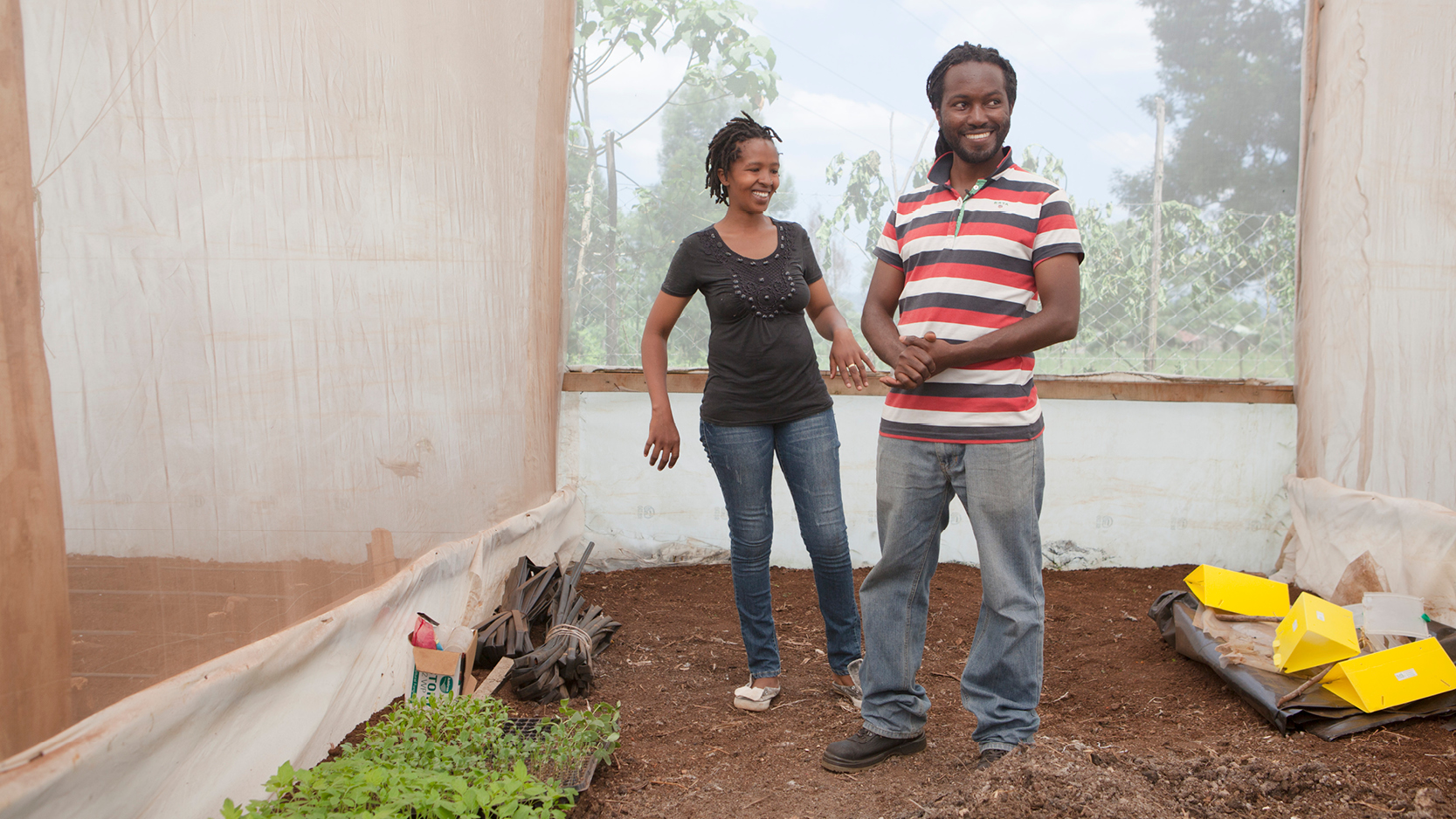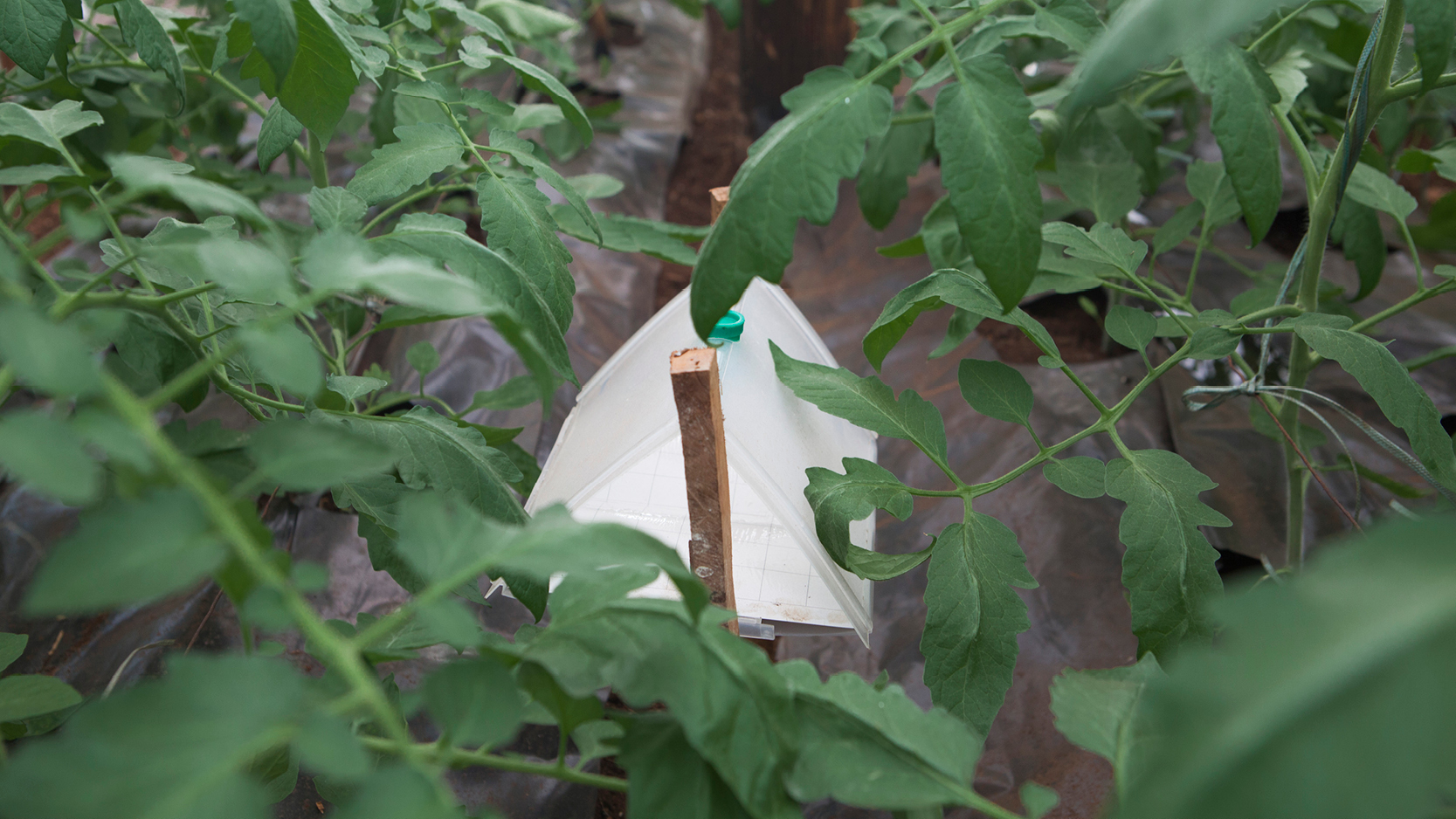One thing is clear as you make the trek across Kericho County—this is tea country. Located in the southwestern part of Kenya within the highlands of the Great Rift Valley, bright emerald green tea plants cover the rolling hills. Kenya is one of the world’s top exporters of tea, and much of it is grown in this region. But amongst the large plantations, one small farm is changing the local face of agriculture—with ruby red tomatoes.
The drive leading to Nikita Farm is unmarked. There’s no mailing address. This is a place you need to hear about to find, and people certainly have. Neighboring farmers frequently stop by to take tours and meet with the young owner, Victor Kipkorir. Today is no exception, but there is one notable difference—this morning’s visitors have traveled halfway around the world to be here.
A caravan of 4X4 vehicles slowly turns down the drive, coming to a stop in front of the farm. Ten American college students with the Land O’Lakes Global Food Challenge Emerging Leaders for Food Security™ fellowship and their accompanying university advisors stream out, eager to stretch their legs. Victor steps toward the crowd, ready to share his story.

Two hours later, the group loads back up and heads to its next destination. A few of us stay behind with Victor, settling down in plastic lawn chairs to chat. Bubbas, the family dog, lays at our feet. It’s early afternoon, and the sun is starting to get hot. Chickens cluck and wind chimes play softly in the distance. This is a far cry from the hustle-and-bustle of Dubai that Victor left behind.
Electronics to agriculture
Just a few years ago, Victor was working non-stop as an electronics engineer for an airline. He and his wife, Nicolette, wanted a change. The young entrepreneurs decided to move their family back home to Kenya and build a farm from the ground up. It was a big change, but they believed in their dream.
According to the Feed the Future initiative, more than 75 percent of Kenyans make some part of their living in agriculture. It’s the backbone of the country’s economy. But only about 20 percent of Kenyan land is suitable for farming and most farmers work without basic agricultural inputs or updated technology. Many also lack adequate financial or extension services, meaning it’s not easy to get a loan to kick-start your business.
But amongst the challenges lie countless opportunities. And thanks to increased education and training, the country’s younger generation is rising to the occasion. New innovations and new ways of thinking are shaping the future of farming in Kenya, increasing incomes and building stronger communities.
The way Victor sees it, everyone in the world has to eat. He’d always had a passion and appreciation for farming, though no personal experience. So he and his wife taught themselves, embodying the question of, “Can we Google that?” They learned tomatoes were a popular crop for new farmers and there was a strong market demand. They also learned tomatoes can be finicky plants, susceptible to pests and water damage during the rainy season. But then they stumbled upon greenhouse farming, which had its advantages. Greenhouse tomatoes mature more quickly and offer farmers more control over temperature and irrigation.
The couple took the gamble, built a greenhouse and planted their first tomato seedlings in the freshly broken ground.
The trouble with tomatoes
Victor’s first crop didn’t go so well. There was a small but devastating problem—Tuta absoluta had infested the plants. This tomato moth causes a 100 percent loss in tomatoes. The pest currently affects thousands of farmers in Kenya and has shown a resistance to pesticides.
Victor went online, looking for a solution. He found Kenya Biologics, Ltd. The company provides farmers with green, safe and cost-effective crop protection products, and actively supports sustainable food production in sub-Saharan Africa. The company was founded in 2007. In 2014, Kenya Biologics was among three proof-of-concept innovations to win a seed funding and technical assistance award through the Feed the Future Kenya Innovation Engine (KIE).
KIE is a five-year program, funded by USAID and implemented by Land O’Lakes International Development. The program identifies, nurtures and brings to scale innovative, private sector-oriented solutions to combat food security, under-nutrition and poverty. Since its start in 2012, KIE has awarded funds to 23 innovations, benefitting more than 73,000 smallholder farmer households in the process.
Kenya Biologics used this award to test its Tutrack innovation. Tutrack is an affordable, environmentally-friendly pheromone-based system for trapping Tuta absoluta.

The innovation is unique because the lure is specifically designed for the Kenyan climate and market and is currently being developed in collaboration with Kenyan smallholder farmers, those who typically farm on less than an acre of land and live in geographically dispersed areas.
Victor was one of 10 farmers to attend the initial training on the Tutrack innovation in Kericho County. He was open to trying new ideas and testing to see what would work on his farm. The innovation worked. His next crop of tomatoes was pest-free and reached its full yield potential. More tomatoes meant more income, and Victor was soon able to start poultry and passion fruit farming.
A bright future
It’s now late in the afternoon and Victor is walking us through his passion fruit orchard. The fruits are coming along nicely. Walking beneath the sundrenched vines, Victor says they will be ready for the export market soon. He’s had a buyer lined up since the plants first went into the ground. He’s planning a second tomato greenhouse, too. This one will be automated and temperature controlled, another first for the region.
Growing tomatoes instead of tea, he says with a smile, doesn’t seem like such a crazy idea to his fellow farmers anymore.